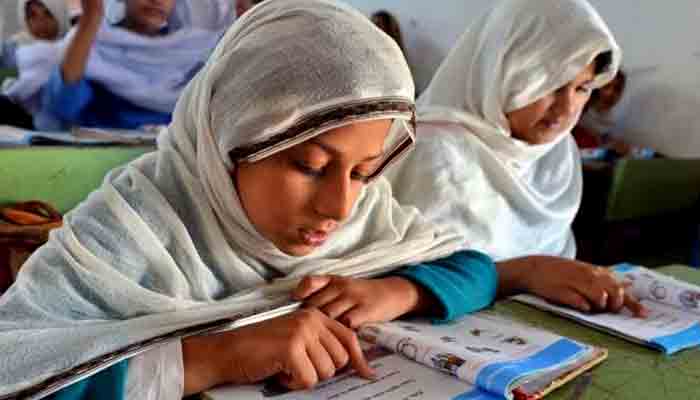More than 90pc students across Pakistan underachieving in maths and science: study
More than 15,000 students in 153 schools completed standardised tests in mathematics and science as part of the HEC-funded study
More than 90 per cent of primary and lower-secondary students in Pakistan have only a weak or basic understanding of the mathematics and science they are required to learn, according to a nationwide study conducted by faculty at the Aga Khan University’s Institute for Educational Development, Pakistan (IED).
More than 15,000 students in grades five, six and eight in 153 public and private schools across the country completed standardised tests in mathematics and science as part of the study, which was funded by Pakistan’s Higher Education Commission. All tests were aligned with Pakistan’s curriculum and have been validated for use in the country by previous studies.
The average mathematics score was 27 out of 100. The average science score was 34 out of 100. Only one per cent of students scored over 80 in either subject, thereby demonstrating what researchers called “excellent understanding”. Girls slightly outperformed boys in science and tied boys in mathematics. The average score in private schools was higher than in public schools, but did not exceed 40 in either subject. The average score in Punjab was the highest among the country’s regions, but did not exceed 40 in either subject. In total, 78 public schools and 75 private schools participated in the study. Eighty per cent of students were the children of parents with a high school certificate or less.
Only one in 20 eighth graders could correctly answer the following question: “There are thirty students in a class. The ratio of boys to girls in the class is 2:3. How many boys are there in the class?”
Only one in 50 could convert “ten million, twenty thousand and thirty” into numeric form. Fewer than one in 10 could identify the reason that the heart beats faster during exercise.
“Science and mathematics education are in dire need of attention from practitioners and policymakers,” said Assistant Professor Nusrat Fatima Rizvi, a study co-principal investigator. Researchers found that multiple factors were significantly correlated with students’ learning outcomes.
In increasing order of importance, those factors were high-quality teaching practices, a student’s mother having a bachelor’s or master’s degree (a father’s educational attainment was relatively less important), only one language being used in the classroom, attending private school and going to school in Punjab. Surprisingly, students tended to learn less from experienced teachers than from those new to the profession. They also tended to learn less from teachers with a degree in education, compared to teachers having no degree in education.
The researchers visited the classrooms of 589 teachers to assess the quality of their instruction. The teaching practices of nearly 9 in 10 were graded weak, and roughly 1 in 10 were graded mediocre. No teachers exhibited what the researchers described as good teaching practice.
“In most classrooms, teachers spend their time reading and explaining words from the textbook instead of encouraging students to ask questions or participate in activities that bring concepts to life,” said Associate Professor Sadia Bhutta, the study’s principal investigator. “This results in poor understanding of concepts and poor performance on tests.”
Among the study’s notable findings was that students in monolingual classrooms – where the textbook, teaching and examinations were all in one language – outperformed those in multilingual classrooms.
Researchers also interviewed teachers to understand the challenges they face. The discussions revealed the urgent need to provide teachers with professional development opportunities to improve both their subject matter knowledge and their ability to reflect on their own pedagogy.
IED’s Dr Sadia Muzaffar Bhutta, Dr Nusrat Fatima Rizvi, Sohail Ahmad, Khadija Nadeem, Naureen Imran, Sabina Khan and Maimona Khan were part of the project’s research team.
-
 Camila Mendes Finally Reveals Wedding Plans With Fiancé Rudy Mancuso
Camila Mendes Finally Reveals Wedding Plans With Fiancé Rudy Mancuso -
 Beatrice, Eugenie Blindsided By Extent Of Sarah Ferguson’s Epstein Links
Beatrice, Eugenie Blindsided By Extent Of Sarah Ferguson’s Epstein Links -
 Girl And Grandfather Attacked In Knife Assault Outside Los Angeles Home
Girl And Grandfather Attacked In Knife Assault Outside Los Angeles Home -
 Super Bowl Halftime Show 2026: What Did Trump Say About Bad Bunny?
Super Bowl Halftime Show 2026: What Did Trump Say About Bad Bunny? -
 Piers Morgan Defends Bad Bunny's Super Bowl Performance, Disagrees With Trump Remarks
Piers Morgan Defends Bad Bunny's Super Bowl Performance, Disagrees With Trump Remarks -
 Andrew Lands In New Trouble Days After Royal Lodge Eviction
Andrew Lands In New Trouble Days After Royal Lodge Eviction -
 Instagram, YouTube Addiction Case Trial Kicks Off In California
Instagram, YouTube Addiction Case Trial Kicks Off In California -
 Agentic Engineering: Next Big AI Trend After Vibe Coding In 2026
Agentic Engineering: Next Big AI Trend After Vibe Coding In 2026 -
 Keke Palmer Makes Jaw-dropping Confession About 'The Burbs'
Keke Palmer Makes Jaw-dropping Confession About 'The Burbs' -
 Cher Sparks Major Health Concerns As She Pushes Herself To Limit At 79
Cher Sparks Major Health Concerns As She Pushes Herself To Limit At 79 -
 Former NYPD Detective Says Nancy Guthrie's Disappearance 'could Be Hoax'
Former NYPD Detective Says Nancy Guthrie's Disappearance 'could Be Hoax' -
 King Charles Publicly Asked If He Knew About Andrew's Connection To Epstein
King Charles Publicly Asked If He Knew About Andrew's Connection To Epstein -
 Jessie J Addresses Pregnancy Rumors After Sporting Belly Bump
Jessie J Addresses Pregnancy Rumors After Sporting Belly Bump -
 Channing Tatum Leaves Fans Scratching Their Heads With Message About South Korea
Channing Tatum Leaves Fans Scratching Their Heads With Message About South Korea -
 Emma Roberts Stars In 'A Body In The Woods'
Emma Roberts Stars In 'A Body In The Woods' -
 'Our Estrangements Can Kill Us': Meghan's Co-star Weighs In On Anthony Hopkins Interview
'Our Estrangements Can Kill Us': Meghan's Co-star Weighs In On Anthony Hopkins Interview




